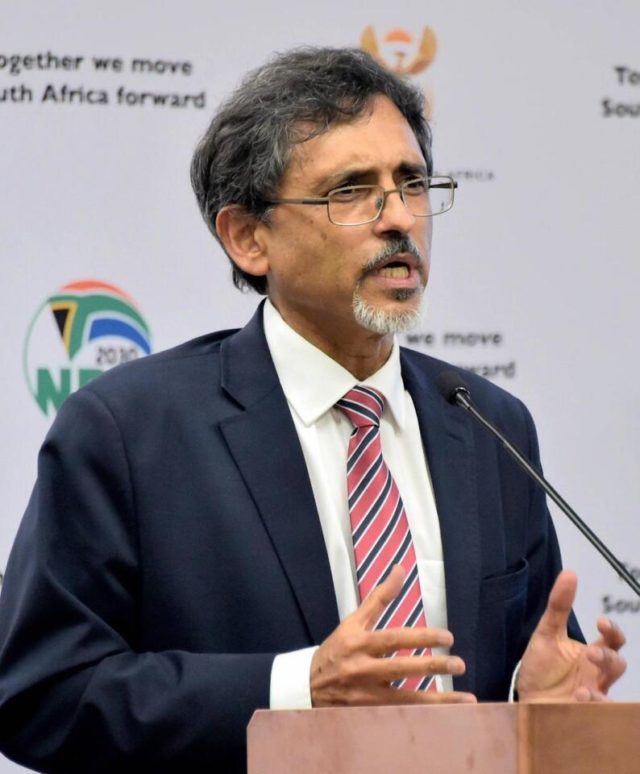Minister has until Monday to lift the ban on the sale of prepared, warm and cooked food, or face legal action
BUSINESS organisation Sakeliga will take Trade and Industry Minister Ebrahim Patel to court unless he “ceases and reverses his department’s unlawful, irrational, and harmful, obstructions to food production”, the organisation said on Saturday.
Sakeliga had on Friday given Patel until 9am on Monday to provide an undertaking to cease and reverse his pronouncements on the production and sale of “prepared”, “warm”, and “cooked” food, Sakeliga CEO Piet le Roux said in a statement.
“We have been advised that there is no lawful restriction on the production of ‘warm’, ‘cooked’ or ‘prepared’ food as the minister and his department continues to insist. We have also been advised by senior counsel that there is no lawful basis on which the CIPC (Companies and Intellectual Property Commission) can certify whether products and services are essential or not. Officials keep issuing these arbitrary directives in press statements and tweets, but nothing of the sort has been promulgated,” Roux said.
“The dti’s (Department of Trade and Industry) attempts to legislate by mere pronouncement are, irrespective of the merits of its instructions, a danger to the rule of law. Even in the face of our unusual circumstances, the principles of constitutionality and legality must be followed.
“Not only has it not been promulgated, but the very idea of prohibiting the sale of cooked, warm, or prepared food is irrational and harmful to public health – every food item on shop shelves is cooked, or has been warmed, or is prepared in some way.
“From pastas to canned food to bread to vegetables to cold meats to dairy products and so one can go on. It is an impossibility in law to define what the minister and his officials are declaring ‘illegal’ and there is simply no way to comply with it. It serves only to intimidate informal traders and small and medium-sized enterprises, as well as to decrease food supply and increase prices,” Le Roux said.
“While restaurant operation had been prohibited, no regulation disallowed the sale of cooked or pre-cooked foods. Moreover, no regulation prohibited restaurants converting themselves to essential service providers, like delis, bakeries, supermarkets, and other food production entities that sell and do deliveries but are not open to public seating and serving.
“Arbitrary directives in a time of social uncertainty also jeopardise the safety of well-meaning citizens. Business people and customers acting in good faith now face law-enforcement officers acting upon ultra vires public pronouncements of ministers as if their directives are lawful, understandable, and enforceable.
“Given how many businesses and NGOs are needlessly being ground to a halt, Sakeliga is expanding its offer to subsidise personalised legal opinions for ‘essential service’ providers. The purpose of the legal opinion is to offer businesses legal certainty and with something to present in good faith to law-enforcement officers who might be acting upon unclear or even unlawful instructions,” he said.
The legal aid offer meant that Sakeliga would pay 100 percent of the fee for a personalised legal opinion to the first 50 not-for-profit organisations, or NGOs, that applied. All businesses that could make a bona fide prima facie case for being an “essential service” provider or having to conduct “essential” care and maintenance already qualified for a 50 percent subsidy by Sakeliga for their legal opinion. Businesses and NGOs could apply at www.sakeliga.co.za/en/covid19.
“It is both impossible and undesirable for government to be everywhere at once and in control. Social crises are solved through community institutions. We need to free them from the obstruction of contradictory legislation and unlawful conduct so that they too may provide ‘essential’ services.
“Why should only government distribute food, but not NGOs? Is it now illegal to operate soup kitchens – even if the delivery of that soup is done with all hygienic measures in place? Why is everything that citizens can do to help each other apparently illegal, unless granted permission for by bureaucrats? This is not the hallmark of a society that trusts its members to help each other solve problems – it is central planning, the pretence of knowledge, and the ruin of communities,” Le Roux said.
– African News Agency (ANA)








